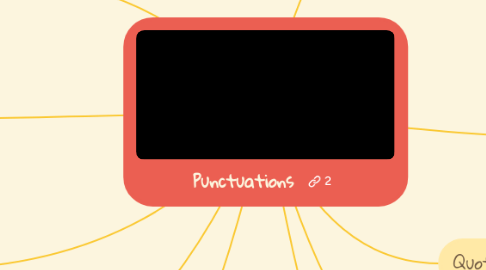
1. Colon
1.1. Introduce example, introduction and details.
1.1.1. Other type 2 diabetes risk factors include the following: High blood pressure, high blood triglyceride (fat) levels, gestational diabetes or giving birth to a baby weighing more than 9 pounds, high-fat and carbohydrate diet, high alcohol intake, sedentary lifestyle and obesity or being overweight.
2. Semicolon
2.1. Used at the end of a full sentence
2.1.1. Show ideas before and after the semicolon are connected
2.1.1.1. I have a big test tomorrow; I can't go out tonight.
3. Aposthrophe
3.1. Replace a missing letter
3.1.1. She doesn't eat cheese.
3.2. Show possession
3.2.1. That is my friend's book.
3.3. Not generally used for plurals.
3.3.1. EXCEPTIONS
3.3.1.1. How many a's in 'Malaysia'?
4. Dash
4.1. Add extra information
4.1.1. He had escaped—or so he thought
5. Parentheses
5.1. Adding non-essential information to a sentence
5.1.1. Vladimir Mayakovsky (1893-1930) was one of the famous poets of the revolution era.
5.2. Giving reader options
5.2.1. Write your suggestion(s) here.
5.3. Try to avoid using parentheses to add longer ideas in your sentence.
5.3.1. Consumption of processed meat (which has been linked to many diseases, including colon cancer) is rising in many parts of the world.
6. Period/Full Stop
6.1. In the end of the sentence.
6.1.1. My name is Shasha.
6.2. Don't put a space before the full stop; put one after.
6.2.1. My birthplace and hometown both are in Malaysia. But I live at United Kingdom.
6.3. Could be a short and simple sentence
6.3.1. I love cats.
6.4. Could be a long and complex sentence.
6.4.1. I love to learn English because I got to learn how to speak with foreigner and at a same time, I also can learn their culture.
6.5. Used in some abbreviations.
6.5.1. Mr./Dr. (American English) a.m/p.m (British English)
6.5.1.1. The wedding wasn't until 3:00 p.m., so she had all day to get ready.
6.5.2. e.g./etc./i.e.
6.5.2.1. Some of the things he likes to do in his spare time, e.g., racing cars, are dangerous.
7. Comma
7.1. Seperate items in a list
7.1.1. Jackson love fried rice, fried chicken, ice cream and cakes so much.
7.2. Needed with certain conjunctions
7.2.1. You can go to the trip, but make sure to take care of your health.
7.3. Add non-essential information
7.3.1. Apparently, he's been suffering from deppression for several years.
8. Quotation Mark
8.1. Quoting what someone said
8.1.1. Single
8.1.1.1. Express irony, sarcasm or skepticism
8.1.1.1.1. Paying 100 euros for 'luxury economy' was not a good idea.
8.1.1.2. To refers to words as words
8.1.1.2.1. 'Chrysanthemum' is a difficult word to spell.
8.1.2. Double
8.1.2.1. He threw the ball and said "I will not give up, just wait and see!"
9. Question and Exclamation Marks
9.1. Add at the end of a direct question
9.1.1. How are you?
9.2. Add some emphasis or emotion to a sentence
9.2.1. It's so cold in here!
10. Hyphen
10.1. Make compound words, especially compound adjectives
10.1.1. It's a six-hour flight to Mumbai
10.2. Compound words with numbers
10.2.1. Sara is a three-year-old girl.
10.3. With some prefixes
10.3.1. His ex-wife dead last night in a hotel at Morocco.
10.4. Prefixes with numbers or proper nouns
10.4.1. post-1950 politics
10.4.2. anti-European
10.5. Compound numbers and fractions
10.5.1. Three-quarters of the population
